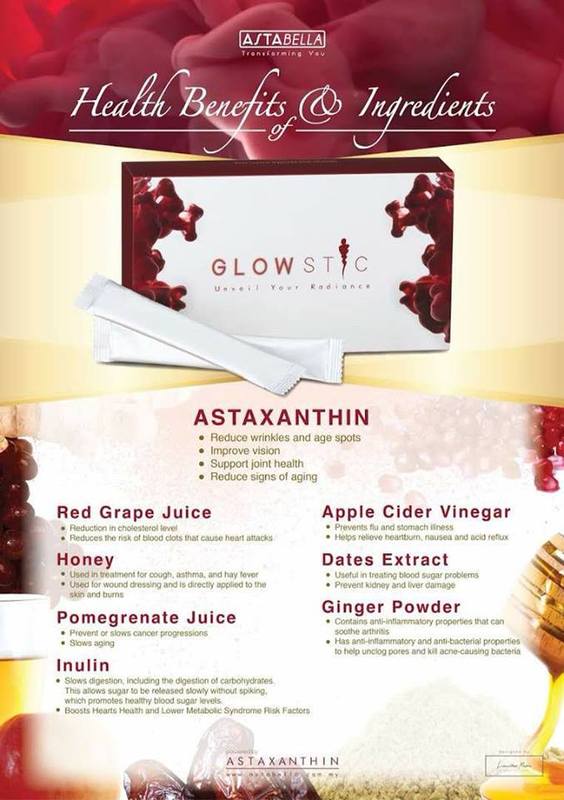Astabella Glow Stic

Astaxanthin is an anti-oxidant in the carotenoid family that gives salmon it’s red-orange color. Research published in The Journal of Nutrition and Metabolism suggests astaxanthin can reduce oxidative stress, inflammation and enhance the immune system! According to several studies when it comes to eliminating free radicals astaxanthin can be as much as:
*550 times stronger than vitamin E
*800 times more powerful than CoQ10
*6000 times more potent than vitamin C Astaxanthin was even found to be more than 500 times more powerful than catechins found in green tea! Here is a quick summary of astaxanthin benefits for your health.
- Reduce wrinkles and age spots
- Improve vision
- Support joint health
- Reduce signs of aging
- Improve endurance and exercise recovery
- Reduce risk of Alzheimer’s disease
- Improve skin and reduce sun damage
- Increase energy
- Improve focus and ADHD
As you can see the health benefits of astaxanthin are truly amazing!
Benefits of Astaxanthin on Aging
As we age, our cells change and can more easily become damaged through oxidation. Astaxanthin is an antioxidant that protects your cells from oxidation so your cells stay younger and free from damage. According to researchers at Washington State University, taking an astaxanthin supplement could have a major impact on slowing the aging process and giving you glowing clear skin.
Another study confirms the findings of the above research. Animals given 20 mg astaxanthin daily for four months had improved cellular function in their white blood cells and also better glutathione levels. The scientists who tested the animals believe that the supplement worked by repairing damage to their DNA and protein, two vital processes in the body tied closely to aging.
Astaxanthin Benefits Reduce Age Spots
In the early 1990s, astaxanthin showed up as a food supplement on health food store shelves but wasn’t as well-known for its properties as beta-carotene or other carotenoids. That may be because there were far more studies on other carotenoids or because its anti-inflammatory properties aren’t as sensational as that of fish oil or curcumin.
However, astaxanthin has antioxidant benefits that far-outweigh those of fish oil by itself. In one Japanese study, scientists gave 3 mg supplements of astaxanthin twice daily to 30 women between the ages of 20 and 55 at the end of breakfast and dinner. The women also applied an additional 1 ml of astaxanthin topically onto their face twice daily after they washed their face in the morning. They did this for eight weeks. Japanese researchers found that by taking the astaxanthin, the women’s skin improved with respect to wrinkles, texture, elasticity, and age spots.
And in another study by the same researchers, men who took the oral supplements (but not the topical application) experienced similar decreases in wrinkles and elasticity of the skin. As we age, there are major changes that occur in the skin in all these areas that the scientists tested. Our number of wrinkles increase, sometimes to the point where we don’t even want to look in the mirror.
Our skin elasticity decreases, becomes less supple, and age spots can begin to occur. The skin’s production of oil decreases as well as the moisture content, especially in those with dry skin. As a result, we tend to look tired and not as vibrant as in our younger years. But with astaxanthin, we find this decline is delayed and improved. Astaxanthin has also been found to inhibit the negative effects of UV-A light by decreasing the secretion of IL-6.
This means that this carotenoid would significantly protect against photo-aging damage such as sagging and wrinkles. There is strong evidence that astaxanthin could be the most powerful anti-aging antioxidant in the world but it has other benefits as well including improving energy and endurance.
Astaxanthin Benefits Increase Energy and Athleticism
One of the best ways to determine whether or not a supplement works for athletes is to test its effects on free radicals and antioxidant levels in the body after exercising. Exercise is a known producer of free radicals. The greater the body’s ability to quench free radicals, the quicker an athlete can recover from a workout session.
Researchers who tested the health benefits of astaxanthin on soccer athletes who took supplements of astaxanthin for 90 days found they had excellent results. Exercising increased all the soccer athletes’ free radical production and oxidative stress. However, the group that took the astaxanthin prevented the rise in free radicals and depletion of antioxidants.
This says a lot for how the supplements could make a difference in recovering from workouts. Tests on athletes who were cyclists in Louisiana found that a supplement of 4 mg astaxanthin per day taken for 28 days had significantly better cycling time trial scores and greater power output than those who didn’t.
Should you use astaxanthin? It’s up to you… but if you goals are to slow aging, enhance energy and improve brain health then it’s an excellent choice.
References
Tominaga, K., Hongo, N., Karato, M., and Yamashita, E. Cosmetic benefits of astaxanthin on human subjects. ACTA Biochimica Polonica 2012, Vol. 59, (1):43-47.
Sugarnuma, K., Nakajima, H., Ohtsuki, M., and Imokawa, G.. Astaxanthin attenuates the UVA-induced up-regulation of matrix-metalloprotein-1 and skin fibroblast elastase in human dermal fibroblasts. J Dermatol Sci 2010 May;58(2);136-42.
Djordevic, B., Baralic, I., Kotur-Stevuljevic, J., Stefanovic, A., Ivanisevic, J., Radivojevic, N., Andjelkovic, M., and Dikic, N. Effect of astaxanthin supplementation on muscle damage and oxidative stress markers in elite young soccer players. J Sports Med Phys Fitness 2012 Aug;52(4):382-92.
Earnest, C.P., Lupo, M., White, K.M., and Church, T.S. Effect of astaxanthin on cycling time trial performance. Int J Sports Med 2011 Nov;32(11):882-8.
Park, J.S., Mathison, B.D., Hayek, M.G., Zhang, J., Reinhart, G.A., and Chew, B.P. Astaxanthin modulates age-associated mitochondrial dysfunction in healthy dogs. J Animal Science 2013 Jan;91(1)268-75.